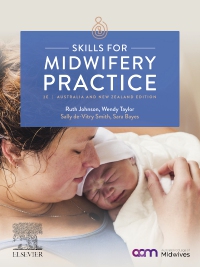
Skills for Midwifery Practice Australian & New Zealand edition - E-Book, 2nd Edition
Elsevier eBook on VitalSource

Now $70.29
This text provides clear, easy-to-read guidance on more than 110 skills for midwifery students and midwives seeking to update their practice.
Underpinned with the most recent evidence-based practice and research, the second edition walks the reader through general and basic skills in a sequential and logical manner, following a woman’s journey through pregnancy, labour and birth, and postnatal care.
With a focus on the performance of midwifery skills rather than on the theory of midwifery practice, Skills for Midwifery Practice Australia and New Zealand 2nd edition is an indispensable text to which students will return to again and again.
-
- Endorsed by the Australian College of Midwives
- Step-by-step instructions for each skill
- Images and diagrams to aid understanding
- A woman-centred approach and cultural considerations throughout
- Models of midwifery care (Continuity of Care and Lead Maternity Carer’s Model)
- Australian/NZ specific guidelines, policies, statistics, terminology and medication administration guidelines
- An eBook included in all print purchases
-
PART 1: GENERAL SKILLS
Section 1: Principles of infection control
Chapter 1: Standard Precautions and hand hygiene
Chapter 2: Asepsis
Chapter 3: Principles of hygiene needsSection 2: Vital signs
Chapter 4: Temperature
Chapter 5: Pulse
Chapter 6: Respiration
Chapter 7: Blood pressure
Chapter 8: Neurological assessmentSection 3: Screening and Testing
Chapter 9: Screening tests
Chapter 10: Venepuncture
Chapter 11: Cannulation
Chapter 12: Obtaining Swabs
Chapter 13: Use of Speculum
Chapter 14: Capillary samplingSection 4: Principles of elimination management
Chapter 15: Micturition and catheterisation
Chapter 16: Urine samples
Chapter 17: Defecation and stool specimensSection 5: Principles of drug administration
Chapter 18: Medication administration: Legal aspects, pharmacology and anaphylaxis
Chapter 19: Oral
Chapter 20: Per vaginum
Chapter 21: Per rectum
Chapter 22: By injection
Chapter 23: Intravenous medications and intravenous therapy
Chapter 24: Blood and iron transfusion
Chapter 25: InhalationSection 6: Skills for supporting antenatal wellbeing
Chapter 26: Building a therapeutic relationship
Chapter 27: Abdominal examination during pregnancy
Chapter 28: Interprofessional working to optimise women's antenatal careSection 7: Skills for preparing women for labour, birth and early parenting
Chapter 29: Facilitating learning in expectant and new parents
PART 2: WORKING WITH THE WOMAN AND BABY DURING LABOUR AND BIRTHSection 8: Monitoring well-being in early labour
Chapter 30: Principles of intrapartum skills: first-stage issues
Chapter 31: Abdominal examination during labour
Chapter 32: Membrane Sweep
Chapter 33: Fetal Heart Monitoring
Chapter 34: Non-pharmacological pain relief
Chapter 35: Water immersion for labour and birth
Chapter 36: Birth at HomeSection 9: Monitoring well-being in established labour
Chapter 37: Fetal Blood Sampling
Chapter 38: Epidural analgesiaSection 10: Monitoring wellbeing during the expulsive phase
Chapter 39: Intrapartum skills in the second stage
Chapter 40: Care of the perineum before and during birth
Chapter 41: Assisted and operative birth
Chapter 42: Maternal and newborn resuscitationSection 11: Monitoring wellbeing during and after the third stage
Chapter 43: Principles of intrapartum skills: third stage
Chapter 44: Postpartum haemorrhage
Chapter 45: Examination and repair of the genital tract following birthPART 3: WORKING WITH THE WOMAN AND BABY AFTER BIRTH
Section 12: Skills for optimising the woman's and baby's physiological wellbeing
Chapter 46: Promoting physiological stability in the mother-baby dyad immediately after normal term birth
Chapter 47: Caring for a woman after a caesarean section
Chapter 48: Caring for the baby's physiological wellbeing after birthSection 13: Skills for supporting the woman to feed her baby
Chapter 49: Supporting the woman to initiate breastfeeding
Chapter 50: Supporting the woman who chooses to formula feedPART 4: CARE OF SELF AND OTHERES
Section 14: Skills for working safely
Chapter 51: Self Care
Chapter 52: Manual handling
Chapter 53: Workplace Health and Safety

 as described in our
as described in our 